GALLUP NEWS SERVICE
PRINCETON, NJ -- Since the first months of George W. Bush's administration, when Bush took a number of initiatives that dismayed environmentalists, the environmental movement and sympathetic politicians have painted the administration as anti-environmental. Given the administration's refusal to reverse course, there was reason to expect that its opponents would generate a backlash against its environmental policies similar to the one that hit the early Reagan administration. The perception that too little was being done on the environment led to an upsurge in public support for environmental protection in the early 1980s that forced the Reagan administration to alter its policies.
Results from Gallup's annual Environmental/Earth Day poll, conducted March 3-5, indicate little evidence of a comparable environmental backlash against the Bush administration. Perhaps national attention to terrorism and the war in Iraq, along with poor economic conditions, has diverted public attention from the administration's environmental record -- despite the continuing efforts of environmental proponents to highlight it.
The only hint of problems for the Bush administration on the environment comes from a modest decline over the past year, from 50% to 44%, in the percentage of Americans praising the president's handling of environmental protection. However, this decline is dwarfed by a concurrent 19-point decline in perceptions Bush is doing a good job on the economic front. Just 44% today (the same figure as for the environment) say Bush is doing a good job of "keeping America prosperous," down from 63% a year ago.
| George W. Bush's Handling of Environmental Protection |
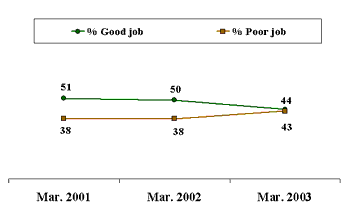 |
A different question in the Environmental/Earth Day poll asks whether the Bush administration has thus far strengthened, maintained, or weakened environmental protection policies. By a 9% to 35% margin, Americans are much more likely to say the administration has weakened rather than strengthened these policies; however, the majority, 53%, believes these policies have been kept about the same. Furthermore, Americans are no more likely to associate Bush with weakening environmental protection today than they were at the outset of his term. In Gallup's April 2001 Environmental/Earth Day survey, 13% believed that Bush would strengthen environmental policies, 48% that he would keep them the same, and 34% that he would weaken them.
| When it comes to environmental protection, which of these do you think is happening under the Bush administration -- the nation's environmental protection policies are being strengthened, the nation's environmental policies are being kept about the same, or the nation's environmental protection policies are being weakened? |
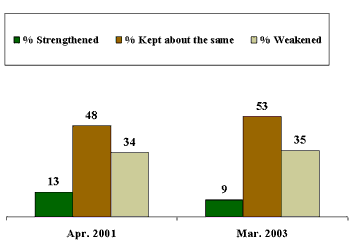 |
Yet, when the focus shifts to the "U.S. government," a different pattern emerges. According to a question that asks, "Do you think the U.S. government is doing too much, too little, or about the right amount in terms of protecting the environment," a majority (51%) thinks too little is being done. Most of the remainder (37%) believes that the right amount of effort is being made, while 7% consider it too much.
While there has been a slight decline in public approval of the Bush administration's environmental performance over the past year, over the longer term, there has been an increase in public satisfaction with the federal government's environmental protection efforts. The percentage saying the U.S. government is doing about the right amount rose from 26% in 1992, to 30% in 2000, to 37% this year. At the same time, the percentage saying it is doing "too little" fell to 51% this year, down from 58% in 2000 and 68% in 1992.
| Level of U.S. Government Environmental Protection Efforts |
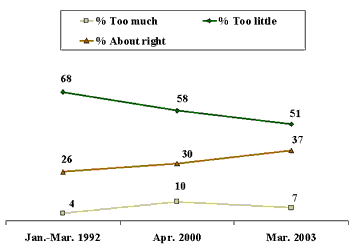 |
Thus, public appraisal of the federal commitment to environmental protection is currently ambiguous. While there is a slight decline in public approval of the Bush administration's environmental performance over the past year, there is also a decline in the percentage of the public believing that the federal government is not doing enough to protect the environment.
Historical Perspective
To put Gallup's 2003 environmental findings in perspective, it is important to note that historically, public support for environmental protection has been closely tied to perceptions of the degree to which the federal government can be relied on to protect the nation's environment. Because Americans tend to see environmental protection as a governmental responsibility, they express more support for environmental protection when they think the government is not doing its job and -- somewhat non-intuitively -- less support when they think the government is committed to environmental protection. In the early Reagan administration, for example, there was a major upsurge in public support for environmental protection, reversing the decline that had occurred during the heavily pro-environmental Carter administration. In addition, in the late 1990s, the perception of the Newt Gingrich-led Republican Congress as anti-environmental halted the decline in support for environmental protection that had occurred in the first term of the largely pro-environment Clinton-Gore administration. (See my review of long-term trends in environmental opinions in the September/October 2002 issue of Public Perspective.)
It is likely that the combination of a poor economy and the focus on national security has lowered the salience of environmental issues for many Americans, preventing environmentalists from mounting a backlash against a declining federal commitment to environmental protection. At the same time, however, the Environmental/Earth Day poll reveals continued strong support for pro-environmental policies. A range of proposals favored by environmentalists but not the Bush administration -- from higher emissions standards for industry, to controls on greenhouse gases, to higher emissions standards for automobiles -- are favored by at least three-quarters of Americans. Three in four Americans also favor "more strongly enforcing federal environmental regulations." In contrast, two goals of the Bush administration that environmentalists oppose -- the opening of the Arctic National Wildlife Refuge to oil exploration and the expanded use of nuclear energy -- continue to receive only minority support.
| Views of Specific Environmental Proposals |
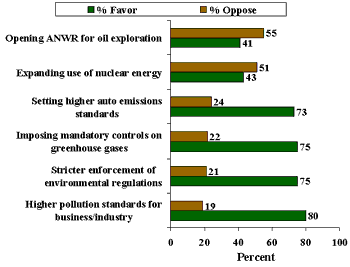 |
| Mar. 3-5, 2003 |
The overall picture emerging from this year's poll is that while the Bush administration's environmental initiatives -- so heavily criticized by environmentalists -- have not generated widespread public opposition, the administration has clearly not convinced the public that environmental regulations need to be relaxed in order to achieve energy security.
A key element of the environmental backlash that forced the Reagan administration to temper its environmental initiatives was a dramatic growth of organized environmental activism, as organizations such as the Sierra Club increased their memberships by portraying Reagan as a threat to the environment. Again, however, the 2003 Environmental/Earth Day poll suggests little evidence of growth in environmental activism in reaction to the Bush administration. When asked about their relationship to the "environmental movement," only 14% of Americans identify themselves as "active participants," down from 19% a year ago. There is also a slight decline in the number who say they are "sympathetic, but not active," with the result that the percentage calling themselves "neutral" has risen 8 percentage points over last year.
| Americans' Self-Identification With the Environmental Movement |
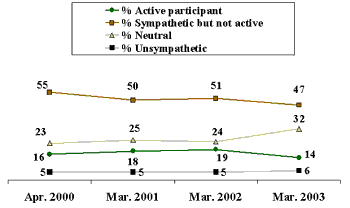 |
A subsequent set of items focusing on environmental behavior yields a somewhat different image. Although lifestyle behaviors like recycling, reducing energy use, and buying "green" products remain most popular (and virtually unchanged from 2000), three of the four "activism" items show slight changes over the past three years. Most notable is the 5 percentage-point increase in those reporting that they are active in an environmental protection group or organization. On the other hand, contributing money to such groups or working for candidates because of their environmental records registered negligible 2 percentage-point gains. Those reporting having contacted a public official about an environmental issue declined a very modest 3 percentage points.
In sum, this year's Environmental/Earth Day poll provides mixed signals concerning public reaction to the nation's environmental protection policies. Despite intense efforts by environmentalists and their political supporters to paint the Bush administration as anti-environmental, there is scant evidence of their success. At the same time, the results suggest that the administration has not succeeded in convincing the public that environmental regulations need to be relaxed in order to achieve energy security. Since 9/11, Americans have been preoccupied with national security, and it will be interesting to see if in the coming year the environmental community has more success in focusing the public's attention on the environmental record of the Bush administration and Republican-controlled Congress.
Riley E. Dunlap, Gallup Scholar for the Environment, formerly Boeing Distinguished Professor of Environmental Sociology at Washington State University, now holds the Donner Professorship at Abo Akademi (Finland's Swedish-speaking university) in Turku/Abo, Finland.
Survey Methods
These results are based on telephone interviews with a randomly selected national sample of 1,003 adults, 18 years and older, conducted Mar. 3-5, 2003. For results based on this sample, one can say with 95 percent confidence that the maximum error attributable to sampling and other random effects is plus or minus 3 percentage points. In addition to sampling error, question wording and practical difficulties in conducting surveys can introduce error or bias into the findings of public opinion polls.
Do you think George W. Bush is doing a good job or a poor job in handling each of the following issues as president? How about -- [RANDOM ORDER]?
A. Protecting the nation's environment
|
|
|
FAIR/MIXED (vol.) |
|
|
|
% |
% |
% |
% |
|
|
2003 Mar 3-5 |
44 |
43 |
7 |
6 |
|
2002 Mar 4-7 |
50 |
38 |
7 |
5 |
|
2001 Apr 6-9 ^ |
49 |
41 |
4 |
6 |
|
2001 Mar 5-7 ^ |
51 |
38 |
5 |
6 |
B. Improving the nation's energy policy
|
|
|
FAIR/MIXED (vol.) |
|
|
|
% |
% |
% |
% |
|
|
2003 Mar 3-5 |
39 |
45 |
7 |
9 |
|
2002 Mar 4-7 |
46 |
36 |
8 |
10 |
|
2001 Apr 6-9 ^ |
54 |
36 |
3 |
7 |
|
2001 Mar 5-7 ^ |
58 |
29 |
6 |
7 |
C. Keeping America prosperous
|
|
|
FAIR/MIXED (vol.) |
|
|
|
% |
% |
% |
% |
|
|
2003 Mar 3-5 |
44 |
45 |
7 |
4 |
|
2002 Mar 4-7 |
63 |
26 |
8 |
3 |
|
2001 Apr 6-9 ^ |
60 |
30 |
4 |
6 |
|
2001 Mar 5-7 ^ |
66 |
23 |
7 |
4 |
|
^ |
Do you think George W. Bush will do a good job or a poor job in handling each of the following issues as president? How about -- [RANDOM ORDER]? |
|
(vol.) Volunteered response |
|
SUMMARY TABLE: BUSH PERFORMANCE ON ISSUES
|
2003 Mar 3-5 |
Good |
Poor |
|
% |
% |
|
|
Keeping America prosperous |
44 |
45 |
|
Protecting the nation's environment |
44 |
43 |
|
Improving the nation's energy policy |
39 |
45 |
When it comes to environmental protection, which of these do you think is happening under the Bush administration -- [ROTATED: the nation's environmental protection policies are being strengthened, the nation's environmental policies are being kept about the same, or the nation's environmental protection policies are being weakened]?
BASED ON -- 505 -- NATIONAL ADULTS IN FORM A
|
|
Kept about |
|
No |
|
|
% |
% |
% |
% |
|
|
2003 Mar 3-5 |
9 |
53 |
35 |
3 |
|
2001 Apr 6-8^ |
13 |
48 |
34 |
5 |
|
^ When it comes to environmental protection, which of these do you think is most likely to happen over the next four years under the Bush administration -- [ROTATED: the nation's environmental protection policies will be strengthened, the nation's environmental protection policies will be kept about the same, or the nation's environmental policies will be weakened]? |
||||
Do you think the U.S. government is doing too much, too little, or about the right amount in terms of protecting the environment?
BASED ON -- 498 -- NATIONAL ADULTS IN FORM B
|
Too |
Too |
About the |
No |
|
|
% |
% |
% |
% |
|
|
2003 Mar 3-5 |
7 |
51 |
37 |
5 |
|
2000 Apr 3-9 |
10 |
58 |
30 |
2 |
|
1992 Jan 5-Mar 31 |
4 |
68 |
26 |
2 |
Thinking specifically about the environmental movement, do you think of yourself as -- an active participant in the environmental movement, sympathetic towards the movement, but not active, neutral, or unsympathetic towards the environmental movement?
|
|
Sympa- |
|
|
|
|
|
% |
% |
% |
% |
% |
|
|
2003 Mar 3-5 |
14 |
47 |
32 |
6 |
1 |
|
2002 Mar 4-7 |
19 |
51 |
24 |
5 |
1 |
|
2001 Mar 5-7 |
18 |
50 |
25 |
5 |
2 |
|
2000 Apr 3-9 |
16 |
55 |
23 |
5 |
1 |
Next I am going to read some specific environmental proposals. For each one, please say whether you generally favor or oppose it. How about -- [RANDOM ORDER]?
A. Expanding the use of nuclear energy
|
Favor |
Oppose |
No opinion |
|
|
% |
% |
% |
|
|
2003 Mar 3-5 |
43 |
51 |
6 |
|
2002 Mar 4-7 |
45 |
51 |
4 |
|
2001 Mar 5-7 |
44 |
51 |
5 |
B. Opening up the Arctic National Wildlife Refuge in Alaska for oil exploration
|
Favor |
Oppose |
No opinion |
||
|
% |
% |
% |
||
|
2003 Mar 3-5 |
41 |
55 |
4 |
|
|
2002 Mar 4-7 |
40 |
56 |
4 |
|
|
2001 Nov 8-11 ^ |
44 |
51 |
5 |
|
|
2001 May 7-9 ^ † |
38 |
57 |
5 |
|
|
2001 Mar 5-7 † |
40 |
56 |
4 |
|
|
^ |
Next, here are some things that can be done to deal with the energy situation. For each one, please say whether you generally favor or oppose it. How about -- [RANDOM ORDER]? |
|||
|
† |
WORDING: Opening up the Alaskan Arctic Wildlife Refuge for oil exploration. |
|||
C. More strongly enforcing federal environmental regulations
|
Favor |
Oppose |
No opinion |
|
|
% |
% |
% |
|
|
2003 Mar 3-5 |
75 |
21 |
4 |
|
2002 Mar 4-7 |
78 |
19 |
3 |
|
2001 Mar 5-7 |
77 |
20 |
3 |
D. Setting higher auto emissions standards for automobiles
|
Favor |
Oppose |
No opinion |
|
|
% |
% |
% |
|
|
2003 Mar 3-5 |
73 |
24 |
3 |
|
2002 Mar 4-7 |
72 |
26 |
2 |
|
2001 Mar 5-7 |
75 |
23 |
2 |
E. Setting higher emissions and pollution standards for business and industry
|
Favor |
Oppose |
No opinion |
|
|
% |
% |
% |
|
|
2003 Mar 3-5 |
80 |
19 |
1 |
|
2002 Mar 4-7 |
83 |
16 |
1 |
|
2001 Mar 5-7 |
81 |
17 |
2 |
F. Imposing mandatory controls on carbon dioxide emissions and other greenhouse gases
|
Favor |
Oppose |
No opinion |
|
|
2003 Mar 3-5 |
75% |
22 |
3 |
SUMMARY TABLE: ENVIRONMENTAL PROPOSALS
|
2003 Mar 3-5 |
|
|
|
% |
% |
|
|
Setting higher emissions and pollution standards for business and industry |
80 |
19 |
|
More strongly enforcing federal environmental regulations |
75 |
21 |
|
Imposing mandatory controls on carbon dioxide emissions/other greenhouse gases |
75 |
22 |
|
Setting higher auto emissions standards for automobiles |
73 |
24 |
|
Expanding the use of nuclear energy |
43 |
51 |
|
Opening up the Arctic National Wildlife Refuge for oil exploration |
41 |
55 |
Thinking about your own shopping and living habits over the last five years, would you say you have made major changes, minor changes or no changes to help protect the environment?
BASED ON -- 486 -- NATIONAL ADULTS IN FORM C
|
Made major changes |
Made minor changes |
Made |
No |
||
|
2003 Mar 3-5 ^ |
23% |
61 |
15 |
1 |
|
|
2000 Apr 3-9 |
31% |
58 |
11 |
* |
|
|
^ |
Asked of a half sample. |
||||
|
* Less than 0.5% |
|||||
Which of these, if any, have you, yourself, done in the past year? [RANDOM ORDER]
BASED ON -- 486 -- NATIONAL ADULTS IN FORM C
A. Been active in a group or organization that works to protect the environment
|
Yes, have done |
No, have not done |
No opinion |
|
|
2003 Mar 3-5 ^ |
20% |
80 |
-- |
|
2000 Apr 3-9 |
15% |
85 |
0 |
B. Voted for or worked for candidates because of their position on environmental issues
|
Yes, have done |
No, have not done |
No opinion |
|
|
2003 Mar 3-5 ^ |
30% |
69 |
1 |
|
2000 Apr 3-9 |
28% |
72 |
0 |
C. Contributed money to an environmental, conservation or wildlife preservation group
|
Yes, have done |
No, have not done |
No opinion |
|
|
2003 Mar 3-5 ^ |
42% |
58 |
* |
|
2000 Apr 3-9 |
40% |
60 |
0 |
D. Contacted a public official about an environmental issue
|
Yes, have done |
No, have not done |
No opinion |
|
|
2003 Mar 3-5 ^ |
15% |
85 |
* |
|
2000 Apr 3-9 |
18% |
82 |
0 |
E. Bought some product specifically because you thought it was better for the environment than competing products
|
Yes, have done |
No, have not done |
No opinion |
|
|
2003 Mar 3-5 ^ |
72% |
27 |
1 |
|
2000 Apr 3-9 |
73% |
27 |
0 |
F. Voluntarily recycled newspapers, glass, aluminum, motor oil or other items
|
Yes, have done |
No, have not done |
No opinion |
|
|
2003 Mar 3-5 ^ |
89% |
11 |
* |
|
2000 Apr 3-9 |
90% |
10 |
0 |
G. Reduced your household's use of energy
|
Yes, have done |
No, have not done |
No opinion |
|
|
2003 Mar 3-5 ^ |
80% |
20 |
* |
|
2000 Apr 3-9 |
83% |
16 |
0 |
|
^ |
Asked of a half sample. |
|
* Less than 0.5% |
|
SUMMARY TABLE: ENVIRONMENTAL ACTIVITIES
|
2003 Mar 3-5 |
Have |
Have not done |
|
% |
% |
|
|
Voluntarily recycled newspapers, glass, aluminum, motor oil or other items |
89 |
11 |
|
Reduced your household's use of energy |
80 |
20 |
|
Bought some product specifically because it was better for the environment |
72 |
27 |
|
Contributed money to an environmental, conservation or wildlife preservation group |
42 |
58 |
|
Voted for/worked for candidates because of their position on environmental issues |
30 |
69 |
|
Been active in a group or organization that works to protect the environment |
20 |
80 |
|
Contacted a public official about an environmental issue |
15 |
85 |
